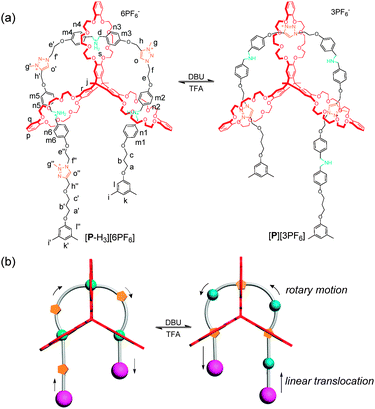Mechanically interlocked molecules have received ever increasing focus over the last number of years due to their potential to mimic the function of macroscopic devices in the molecular world.
Examples include molecular elevators and molecular muscles and with this Communication Zheng Meng and Chuan-Feng Chen of the CAS Key Laboratory of Molecular Recognition and Function at the Chinese Academy of Sciences in Beijing have added pulley-like shuttling motion to the toolkit.
Using their previously reported* triptycene-derived crown ether host and combining it with a linear guest with three dibenzylammonium and three N-methyltriazolium sites, they have made a molecular pulley system that mimics the plain rotary motion and linear translocation of full sized pulleys. The movement is powered by acid or base leading to one end of the cable-like guest moving towards the host while the other moves away (picture).
The researchers have not only added to the toolbox of molecular motion components but also provided new insights towards further developing molecular machines.
If you want to make your own molecular pulley read the article today!
To read the details, check out the ChemComm article in full – it’s free to access until 10th May:
A molecular pulley based on a triply interlocked [2]rotaxane
Zheng Meng and Chuan-Feng Chen
Chem. Commun., 2015, 51, Advance Article
DOI: 10.1039/C5CC01301A
*(a) C. F. Chen, Chem. Commun., 2011, 47, 1674–1688 RSC; (b) Y. Han, Z. Meng, Y. X. Ma and C. F. Chen, Acc. Chem. Res., 2014, 47, 2026–2040
**Access is free through a registered RSC account – click here to register











